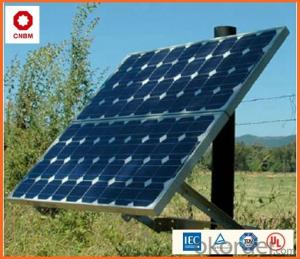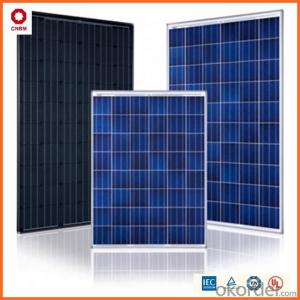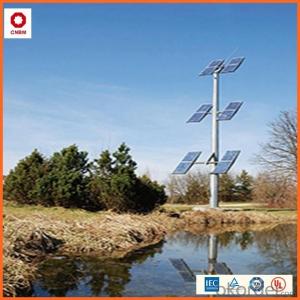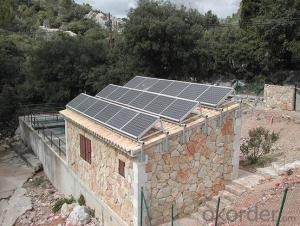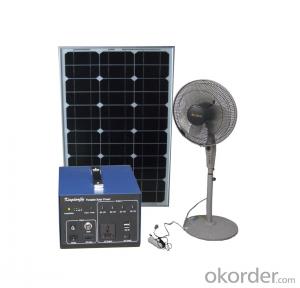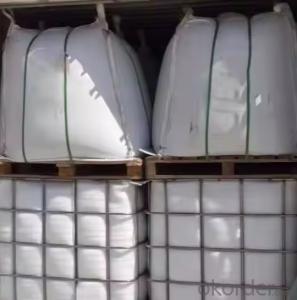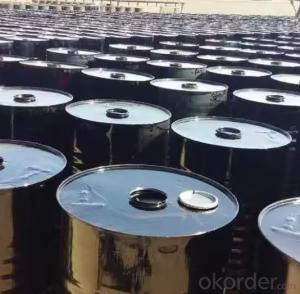65w Poly Small Solar Panels on Stock with Good Quality
- Loading Port:
- China main port
- Payment Terms:
- TT OR LC
- Min Order Qty:
- 1 watt
- Supply Capability:
- 10000000 watt/month
OKorder Service Pledge
OKorder Financial Service
You Might Also Like
Item specifice
Hot Sale !!! Quality and Safety of Small Poly Solar Panel 25~85w
1. Rigorous quality control meets the highest international standards.
2. High-transmissivity low-iron tempered glass, strong aluminium frame.
3. Using UV-resistant silicon.
4. IS09001/14001/CE/TUV/UL
Warranties of Small Poly Solar Panel 25~85w
1. 10 years limited product warranty
2. 15 years at 90% of the minimal rated power output
3. 25 years at 80% of the minimal rated power output
Specification
Characteristics of Poly solar panels CNBM (25-85W) | |||||
Max Power Voltage Vmp(V) | 30.3 | 30.8 | 31.1 | 31.4 | 31.85 |
Max Power Current Imp(A) | 7.60 | 7.64 | 7.73 | 7.81 | 7.85 |
Open Circuit Voltage Voc(V) | 36.1 | 36.6 | 37 | 37.3 | 37.68 |
Short Circuit Current Isc(A) | 8.50 | 8.55 | 8.65 | 8.75 | 8.85 |
Max Power Pm(W) | 230W | 235W | 240W | 245W | 250W |
Temperature Coefficient of Cells Poly solar panels CNBM (25-85W) | |
NOCT | 45± 2 |
Temperature Coeffucients of Isc | 0.0492 |
Temperature Coeffucients of Voc | -0.3374 |
Temperature Coeffucients of Voc | -0.4677 |
Mechanical Data of Poly solar panels CNBM (25-85W) | |
Dimension | 1638 × 982 × 40 mm |
Weight | 19.5 kg |
No. of Cells and Connections | 60 (6 ×10) |
Tolerance | 0 ~ + 5 W |
Cell | Monocrystalline Cell 156 × 156 mm |
Packing | 624 Pcs/40ft(H) Container |
Limits of Poly solar panels CNBM (25-85W) | |
Operating Temperature | -40 to +85 |
Storage Temperature | -40 to +85 |
Max System Voltage | 1000VDC(IEC) / 600VDC(UL) |
Features of our products:
• High conversion efficiency mono/poly-crystalline amorphous silicon solar cells
• Modules incorporate high performance bypass diodes to minimize the power drop caused by shading
• High transmittance, low-iron tempered glass
• High performance EVA encapsulant to prevent destroying and water.
• AI frame: without screw, corner connection. 8 holes on the frame can be installed easily
• Good performance of preventing from atrocious weather such as wind and hails
• Certifications: CE IEC TUV VDE UL, Class I
• 10 years 90% power output warranty

Shipping of Small Poly Solar Panel 25~85w
By Sea | Delivery from Shanghai or Ningbo seaport |
By Air | Departure from Shanghai Pudong Airport |
By Express | Post by DHL, EMS, UPS, TNT. |
- Q:Can solar energy systems be used for powering electric vehicle solar charging parking lots?
- Yes, solar energy systems can definitely be used for powering electric vehicle solar charging parking lots. In fact, this combination of solar energy and electric vehicle charging is gaining popularity as a sustainable solution for transportation and energy needs. Solar panels can be installed on the parking lot structure or nearby rooftops to capture sunlight and convert it into electricity. This clean energy can then be used to power the electric vehicle charging stations located in the parking lot. By utilizing solar power, these charging stations can operate without relying on the grid, reducing the use of fossil fuels and minimizing greenhouse gas emissions. Additionally, solar-powered charging lots offer the advantage of being able to generate electricity during the day when the demand for charging is typically higher. This integration of solar energy systems and electric vehicle charging infrastructure is an innovative and environmentally friendly approach to powering transportation.
- Q:Can solar energy systems be used in powering green hotels or eco-resorts?
- Yes, solar energy systems can definitely be used to power green hotels or eco-resorts. Solar panels can be installed on the roofs of buildings or in nearby areas to generate electricity from the sun's rays. This renewable energy source helps reduce the carbon footprint of these establishments by reducing reliance on fossil fuels. Additionally, solar energy systems can also provide hot water for showers and pools, further enhancing the sustainability of these eco-friendly accommodations.
- Q:Can solar energy systems be used to power boats or yachts?
- Indeed, boats or yachts can utilize solar energy systems for their power needs. By installing solar panels on the boat's roof or deck, sunlight can be captured and converted into electricity. This electrical energy can then be utilized to operate various systems onboard, including lighting, navigation equipment, communication devices, refrigeration, and even propulsion systems. The size and capacity of the solar energy system will be determined by the boat or yacht's specific power requirements and the available installation space. Opting for solar-powered boats and yachts offers numerous advantages, including decreased reliance on fossil fuels, lowered operational expenses, quieter operation, and reduced carbon emissions. However, it is important to acknowledge that solar energy alone may not suffice for larger vessels or extended periods of low sunlight. In such instances, a hybrid system that combines solar energy with alternative power sources, like wind or diesel generators, may be more suitable.
- Q:Can solar energy systems be used for powering breweries?
- Breweries can utilize solar energy systems to power their operations. Solar power, a renewable and sustainable energy source, offers a reliable and cost-effective solution for various industrial facilities, including breweries. By installing solar panels, breweries can generate electricity from sunlight to meet their energy needs. To run their equipment, breweries require a substantial amount of energy, including for boilers, refrigeration systems, pumps, and lighting. Solar energy systems can be tailored to meet these demands by sizing the solar panel array and incorporating energy storage systems like batteries, ensuring an uninterrupted power supply. The advantages of using solar energy in breweries are manifold. Firstly, it helps reduce energy costs by significantly decreasing or even eliminating electricity bills. This is particularly advantageous for breweries, as energy expenses can be a significant burden. By generating their own electricity, breweries can become more self-reliant and reduce their reliance on the grid. Secondly, solar power is an eco-friendly option. Breweries that transition to solar energy can significantly diminish their carbon footprint and minimize their impact on the environment. This can be a valuable selling point, as consumers increasingly prioritize sustainability and show support for businesses that embrace renewable energy. Moreover, solar energy systems require minimal maintenance and boast a long lifespan, making them a reliable and durable energy solution for breweries. With proper installation and regular monitoring, solar panels can last for 25-30 years or more, providing a stable and consistent energy source for breweries. In conclusion, solar energy systems are indeed suitable for powering breweries. They offer substantial cost savings, environmental benefits, and long-term energy reliability. As solar technology becomes more affordable and efficient, it is likely that more breweries will adopt this sustainable energy solution in the future.
- Q:Can solar energy systems be installed on sloped surfaces?
- Yes, solar energy systems can be installed on sloped surfaces. In fact, sloped surfaces are often preferred for solar panel installations as they allow for better sunlight exposure and increased energy production. However, proper mounting systems and angle adjustments may be required to ensure optimal performance and efficiency.
- Q:Can a solar energy system power an entire household?
- It is possible to power an entire household solely with solar energy using a solar energy system. The capacity of the system to do so depends on various factors, including the system's size, the amount of sunlight available, the household's energy consumption, and the efficiency of the solar panels. If the system is properly sized and well-designed, it can generate enough electricity to meet all the household's energy needs, including powering appliances, lights, heating and cooling systems, and other electrical devices. Excess energy produced by the panels can be stored in batteries for use during times of low sunlight or at night. Furthermore, surplus electricity from the solar system can be fed back into the grid, allowing households to earn credits or receive compensation from utility companies. Therefore, with the correct setup, it is indeed possible to solely power an entire household with solar energy.
- Q:How do solar energy systems impact electricity bills?
- Solar energy systems can have a significant impact on electricity bills by reducing or even eliminating the need for traditional grid electricity. By harnessing the power of the sun, these systems generate clean and renewable energy, which can offset a substantial portion of a household's electricity consumption. This can result in lower monthly bills or, in some cases, provide excess energy that can be sold back to the grid, further reducing overall costs.
- Q:Can solar energy systems be used for powering off-grid refugee camps?
- Yes, solar energy systems can be effectively used for powering off-grid refugee camps. Solar panels can be installed in these camps to harness sunlight and convert it into electricity, providing a reliable and sustainable source of power. This can be used to meet the energy needs of the camps, including lighting, cooking, heating, and charging electronic devices. Solar energy systems are cost-effective, environmentally friendly, and require minimal maintenance, making them an ideal solution for off-grid refugee camps in remote areas.
- Q:How does the cleanliness of solar panels affect energy production?
- The cleanliness of solar panels greatly affects energy production. Dust, dirt, pollen, bird droppings, and other forms of debris can accumulate on the surface of the panels, blocking sunlight and reducing their efficiency. Regular cleaning and maintenance of solar panels are necessary to ensure optimal energy output.
- Q:Can solar energy systems be installed on roofs?
- Yes, solar energy systems can be installed on roofs. In fact, rooftops are one of the most common locations for installing solar panels. The main advantage of installing solar panels on roofs is that they utilize the existing space without requiring any additional land. Rooftop solar installations are also advantageous because they are usually unobstructed by shading from trees or buildings, resulting in optimal sun exposure for generating electricity. Additionally, rooftop installations are often cost-effective as they can reduce the need for long-distance transmission lines and can directly supply power to the building they are installed on. Overall, installing solar energy systems on roofs is a practical and efficient way to harness clean and renewable energy.
1. Manufacturer Overview |
|
|---|---|
| Location | |
| Year Established | |
| Annual Output Value | |
| Main Markets | |
| Company Certifications | |
2. Manufacturer Certificates |
|
|---|---|
| a) Certification Name | |
| Range | |
| Reference | |
| Validity Period | |
3. Manufacturer Capability |
|
|---|---|
| a)Trade Capacity | |
| Nearest Port | |
| Export Percentage | |
| No.of Employees in Trade Department | |
| Language Spoken: | |
| b)Factory Information | |
| Factory Size: | |
| No. of Production Lines | |
| Contract Manufacturing | |
| Product Price Range | |
Send your message to us
65w Poly Small Solar Panels on Stock with Good Quality
- Loading Port:
- China main port
- Payment Terms:
- TT OR LC
- Min Order Qty:
- 1 watt
- Supply Capability:
- 10000000 watt/month
OKorder Service Pledge
OKorder Financial Service
Similar products
New products
Hot products
Hot Searches
Related keywords

